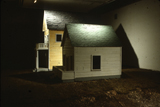From the Outskirts to the Center
| Seventeen women – dancers, musicians, singers – performed in the 1991 In Bocca al Lupo – In the Mouth of the Wolf, a contemporary feminist opera. It opened in Halifax at the MSVU Art Gallery and travelled to Toronto where it was performed in a rented warehouse and then Vancouver at the Western Front. To prepare each performer for her role, Mckeough supplied her with a definition of her character (eg., dangerous animal, or heat); its function; a series of images and metaphors to describe its movements; examples or suggestions for costumes.
In general terms, her working process is organized and meticulously planned. Yet she flirts with chaos, and the results are complex and border on a mess. She maintains a clear vision of the work throughout the developmental period of her projects, and then each individual actress, dancer or singer interprets, bringing to the scene her own talent and experience. The tension between controlled order and chaos is echoed in the structure of the work itself; auditions, planning, scripting and writing are integral to her process, while at the same time McKeough’s work undermines the rigidity of the imposed social structure. Outskirts houses #2, #3 and #4 A dancing bear: melodies and lyrics are haunting, rhythmic and pervasive. A sonorous medieval sounding lament keeps time to the stomping sculptures of cartoon bear feet. “Throw it away, throw it away” – a fitting anthem for our generation, as timeless as the baroque music that inspires it. The bear feet dance on the table, a pine picnic table, a Canadian relic. Unsettling juxtapositions generate content. A vibrating lawnmower appears to cut a swath from a carpet of thick black fur. The red mower clashes in colour with the vivid green walls. It is as though the machine could break free, and consume the rest of the space in its omnivorous path. Water flows wastefully from a faucet into a sink, accompanied by the antiseptic stench of soap. The basins and floor are strewn with teeth, carefully rendered animal teeth carved from phosphate-laden soap. While soap cleans us, our clothes and dishes, McKeough’s work brings to mind that wastewater ends up contaminating natural bodies of water, causing algae populations to explode. After other aquatic plants and fish perish, deprived of oxygen, we are left with the pathetic trophies of their teeth. Metaphors abound in this critical language. The interstices of nature and culture are conflictual and loaded with social and political baggage. It is along seams of proximity, along the outskirts of suburban development where clashes occur, where habitat is steadily encroached upon. It is a space not often regarded from the vantage point of an urban centre, but it is here that inexorable battles are fought, and lost, as every day between 40 – 100 animal species are rendered extinct. Culturally and socially, we navigate our way through this terrain, often indulging in the excesses that we critique. We consume, we throw away. Outskirts plays with absurdity, much like Vladimir and Estragon did when waiting for Godot. Theatre of the Absurd is an apt analogy for the world in disarray as it is showcased by McKeough. Buried within the parody, or just underneath the ironic edge, is also, for me, a kind of grieving, a grieving of the loss that we perpetuate and experience. The last plastic horses, dollar store specials, stand up and collapse, over and over. The collapsing horses are poignant, accompanied by twittering growls and plaintive cries, animals muttering and humming in a vaguely discernable layered soundtrack. Miniature waving ladders, and the horses are there as we leave the space. |
 |
